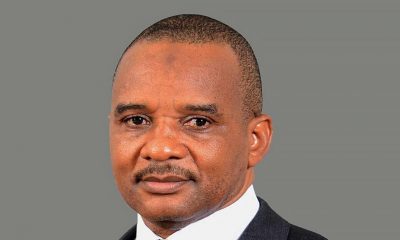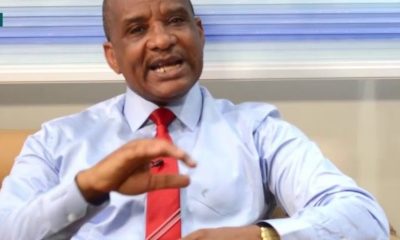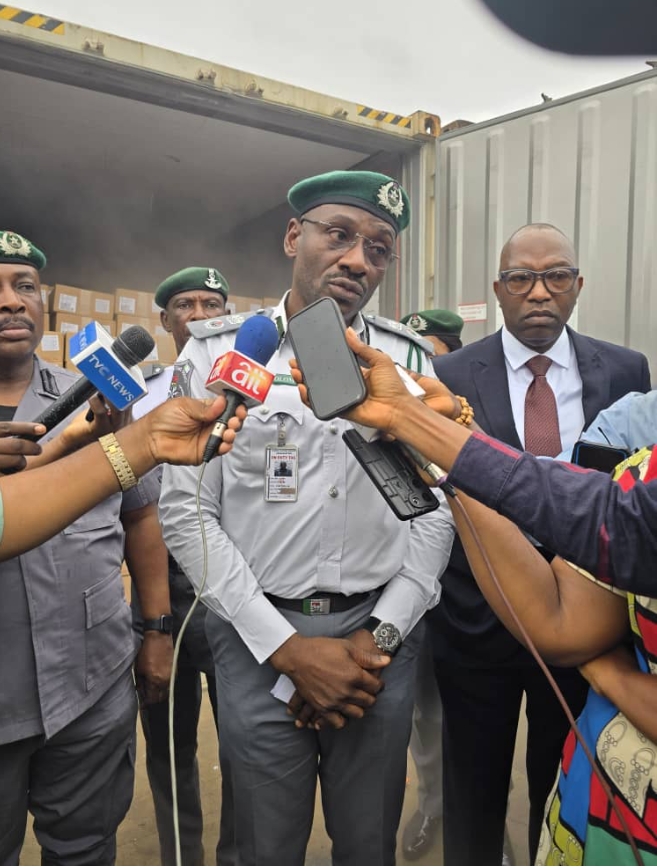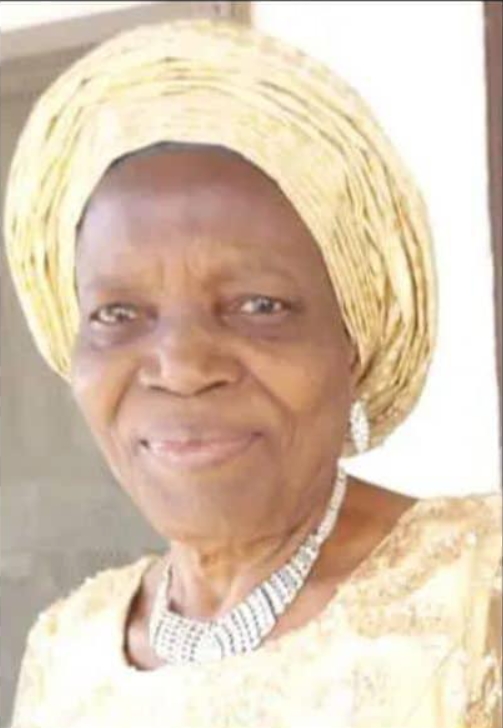Maritime Agencies
THREE YEARS AS NIMASA DG: Jamoh and His Exploits
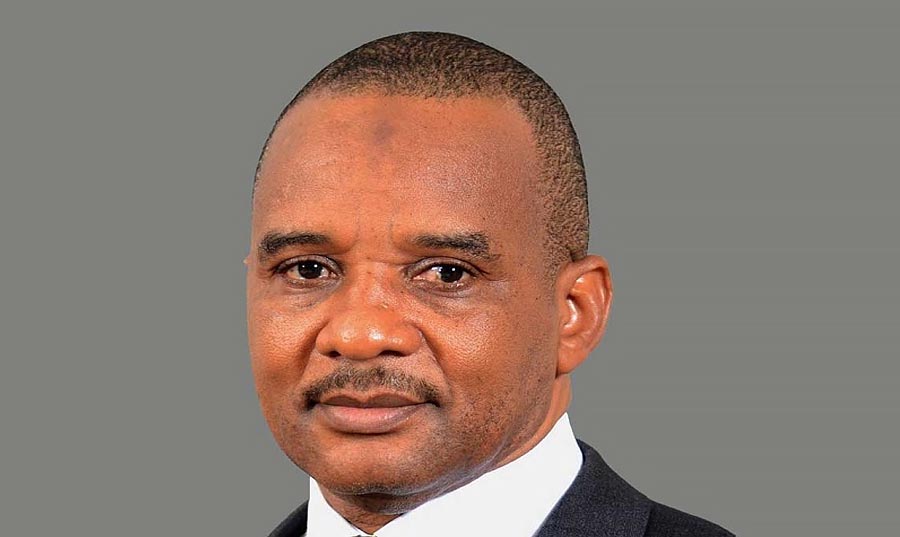
By Izuchukwu Ozoemena
March 10, 2023, Dr. Bashir Jamoh, OFR, was three years in office as Director-General, Nigerian Maritime Administration and Safety Agency (NIMASA). To mark this, the agency’s Public Relations Team articulated his landmark achievements. Falcon Watch Online joins to do a special focus on Bashir Jamoh at three, x-raying specific areas his three-year tenure has made a difference plus a couple of other issues stakeholders expect him to focus on as he runs out his full tenure at the apex maritime agency.
As a home grown industry person, Dr Jamoh , on appointment, did not find it hard to quickly articulate areas of focus where special attention is needed to make a difference. These he dubbed the 3S: maritime Safety, maritime Security and Shipping development.
PIRACY & KIDNAPPING IN GoG
Nigerian waters form an integral part of the Gulf of Guinea (GoG). Nigerian waters and the entire GoG now enjoy a drastic reduction in piracy, incidences of kidnapping and other maritime crimes which hitherto made seafaring in the area a nightmare. In 2020, for instance, 130 cases were recorded; in 2021, it was 57. There was none throughout 2022. The commendable zero incidents of 2022 are even being witnessed as Q1 of 2023 rushes to lapse.
At this rate, stakeholders say, Nigeria now stands to do without payment of Extra War Risk Insurance (EWRI) premiums and other charges introduced on account of piracy and other crimes on waters.
THE DEEP BLUE PROJECT
In June 2021, President Muhammadu Buhari launched the deep blue project. The implementation has brought a marked reduction in maritime crimes because the Team NIMASA under Jamoh applied what can be described as a multi-sectoral approach in an attempt to address nagging problems. The agency struck new levels of strategic collaborations with regional countries and other global shipping nations with huge trade interest in the GoG.
Deep Blue Project assets include Marine Assets: Special Mission Vessels 2 (DB Abuja and DB Lagos), 17 Fast Intervention Boats. Air Assets: Special Mission Helicopters 3, Special Mission Aircrafts 2, Unmanned Aerial Vehicles (UAVs)
Land Assets and 17 Armored Vehicles.
Other facilities are – Command, Control, Computer, Communication and Intelligence (C4i) Centre, Training Facilities (Shooting Range, C4i Training Centre etc.) Various training were organized for all personnel in the deep blue project on how to operate the assets and facilities.
The Deep Blue Project Assets were classified into 3 (three) with over 254 personnel drawn from military and paramilitary organizations. These are Marine, Land and Air Assets.
MARITIME SECURITY:
SPOMO ACT
Before 2019, the nation didn’t have a separate law to try offenders and criminals arrested in piracy and kidnapping. Therefore, Jamoh pushed for a formal legislation and the Suppression of Piracy and other Maritime Related Offences (SPOMO) Act was signed into law by Mr. President in June 2019. As of today, under the SPOMO Act, the agency has secured convictions. This has also served as a deterrent to would-be criminals.
Implementation of the SPOMO Act led to better partnership with the Nigerian Navy and other security agencies within and outside to gainfully explore ways and means to attain peace in the GoG region. The success of this approach enabled Nigeria’s delisting from the International Maritime Bureau’s (IMB) Red List as well as the International Bargaining Forum’s (IBF) Unsafe Waters List.
To further deter these criminalities on the waterways and make the youths gainfully employed, the Agency engaged the Marine Litter Marshals.
REVENUE GENERATION
Since Dr Jamoh mounted the saddle in 2020, NIMASA has paid over N100billion into the federal government coffers. Between January 2020 to June 2022, N99, 944,345,082 was remitted to the federal government, records say.
SEAFARERS DEVELOPMENT
Under the Nigerian Seafarers Development Programme (NSDP), NIMASA has enrolled 2,041 student cadets since inception in 2009.
The number of officers so far trained is 656. While 625 cadets have obtained their Certificate of Competence (CoC), 31 others qualified as Naval Architects. While 360 cadets have completed seatime and are awaiting CoC, 351 have been assigned to MTIs and awaiting seatime; 120 withdrew with10 deceased.
STAFF WELFARE
Dr Jamoh inherited a staff condition of service which was reviewed last in 2010. Realizing the critical role a well-motivated workforce plays in maintaining a productive organization, he went on to secure an upward review of staff condition of service so as to increase commitment and efficiency on their part.
MARITIME SAFETY
At the end of the last quarter, 2021, the Federal Government approved the removal of wrecks from Badagry channel up to the Tin Can Island. In the first quarter of 2022 also, Government approved the removal of wrecks in Western zone in Lagos, Eastern zone in Port Harcourt and central Zone with headquarters in Warri. All these projects have achieved major milestones.
NIMASA engaged the Nigerian Navy Naval Dockyard in Lagos to repair operational vessels, Millennia 1 and Millennium 2. Today both vessels and five others are almost ready for deployment for enforcement purposes. This will also enhance search-and- rescue operation, port and flag state administration, amongst others.
In order to attend to the emergencies that may occur after a Search and Rescue Operation, the Agency has built two brand new Search and Base clinics of international standard at Azare Crescent, Apapa and Kirikiri.
“We are hopeful to commission them soon. The hospital is not for NIMASA or Nigeria, but original Regional States. NIMASA is in charge of nine countries in terms of Search and Rescue. The hospital is of high international standard where we hope to treat all caliber of patients locally and internationally with the state-of- the-arts equipments when completed, NIMASA says.
“In the area of Flag and Port State Administration, at the inception of the administration, there was no single vessel for enforcement in the past. Today, we have built seven brand new bullet proof boats and we expect them to have completed the building. They are being built in Spain, and we are hoping that before the end of March, we will receive and commission the vessels. As soon as the vessels are commissioned, there will be enhanced enforcement performance; and we plan to divide the use of the vessels not only in Lagos, but also to other zones of the Agency. All these will cater for the issue of safety.”
MARITIME TRAINING
In the area of education, the Agency introduced the Nigerian Seafarers Development Programme (NSDP). The Nigerian NSDP development program is a capacity development programme.
In order to ensure that Nigeria’s major maritime training institution is not relegated to the background, NIMASA has improved her interface with the Maritime Academy of Nigeria (MAN) Oron. The Agency’s statutory funding of the MAN Oron has been on point since 2020.
Currently, MAN Oron has Simulators, among other state-of- the- art facilities, and the funding by NIMASA has been unhindered. This is in addition to other private maritime institutions such as Charkins. They are now also coming up with a lot of accreditation of diplomas and other short-term certificate courses that are being done locally, thus, saving foreign exchange.
In addition to this initiative, the Agency created skills acquisition centres across the six geopolitical zones. For the South-West, one is in Lagos. In the South-East, there is one in Anambra; for South-South, there is one in Bayelsa. There is one in Maiduguri, Borno State, for North-East. For North-West, Kaduna has one while one is in Kwara for North Central.
So, these skill acquisition centers have the capacity of training younger Nigerians on different aspects of professionalism in the maritime sector. This idea is to help keep the youths busy thereby stemming the volume of criminality in the territorial waters. Records show that from the third quarter of 2021 till date, one single attack has not been recorded on the territorial waters.
SHIPPING DEVELOPMENT
The critical aspect of shipping development encompasses fleet expansion, shipbuilding and ship repairs. Shipping is responsible for over 90 percent of international transportation of goods that sustain the global supply chain, which is a significant component of the global economy, enhancing import and exports of goods and services.
NIMASA is poised to advance shipping by ensuring a conducive environment for commercial shipping and encouraging more indigenous participation in the global shipping trade.
LAST LINE
No doubt, Dr Jamoh’s scorecard at three years is impressive. But certain areas still yearn for attention as he inches towards the end of his first tenure as NIMASA Director General.
As some industry watchers say, it has become necessary to raise the standard of Nigerian Certificate of Competency (CoC) by inviting United Kingdom and American maritime authorities for a facility and faculty assessment visit to the Maritime Academy of Nigeria, Oron, especially now that basic STWC training equipments are in place. Their observations and recommendations have to be noted and painstakingly followed.
Steps should be taken to possibly meet whatever standards the visitors may prescribe and recruit internationally recognized facility members and trainers for MAN.
Nigeria should sign a MoU with the UK and US authorities to recognize and accept Nigerian CoCs after meeting all the prescribed standards.
Nigeria should put on ground a two-year internal re-evaluation arrangement to ensure that attained standards are not compromised but improved upon in line with the expectations of modern navigation and global maritime trends.
There are expectations that Nigeria should look inwards and train more people at home at lesser costs but with higher chances of working onboard any seagoing vessel anywhere in the world with NIMASA CoC.
Nigeria should consider migrating beyond the present near-coastal voyage (NCV) of certification to certifying masters and chief engineers while constantly re existing MoUs.
NIMASA should work towards improving Nigeria’s ship registry to attract more registrations perhaps beginning with the fleet under the Nigerian LNG Limited (NLNG) whose vessels fly foreign flags.
Till date, illegal poaching of fishes and other aquatic products by foreigners flourish on Nigerian waters with little or no control. Over 40% of global Illegal Unreported and Unregulated (IUU) fishing occur in Africa out of which the GoG accounts for a sizable portion. Jamoh and NIMASA should be able to capture IUU fishing as a maritime crime under its tripod and explore avenues to curb the menace.
For now, many NSDP training beneficiaries remain without jobs. More opportunities should be created for them and others awaiting seatime when indigenous ship-owners have access to fund ship acquisition.
Maritime Agencies
Customs Unveils Automation of Licenses and Permits, Seeks Full Cooperation from Stakeholders.

By Izuchukwu Ozoemena
Automation of licenses and permits in operations has been described as necessary because it will facilitate the ease of doing business in the maritime sector while encouraging an eventual increase in Customs revenue and the national economy.
Comptroller Ngozi Anosike, Controller, License and Permits stated this in Lagos, Monday, while delivering a welcome address at a stakeholders’ engagement on Automation of License and Permits at the Customs Training College, Ikeja.
According to her, automation and permits will enable importers, clearing and forwarding agents initiate and complete the processes of acquisition and renewal of licenses from anywhere including their offices and homes without physically visiting the Customs Headquarters in Abuja. Officers and men of the License and Permit Unit, the bond seat unit of various Commands, she explained, would be saved some stress too as they would simply click on their systems to get results instead of carrying loads of files from one table to another and from one office to the other.
”Automation will cut the cost of doing business and minimize movement risks for our stakeholders.”
”Automation will minimize, if not eradicate fraudulent practices in the system, as every single document that is uploaded in the course of this process will be automatically rejected by default, if it is fake and accepted if it is genuine. L&P can now view assessments through the B’Odogwu to be sure that any company applying for fresh or renewal of licences or permits is not having unpaid assessments hanging on it. The CGC is poised to sanitize the system and we at L&P Unit are very passionate about this to ensure that the objective is achieved.”
Automation, she added, saves time as stakeholders will have the luxury of using the time they would have expended running from Commands or the Customs Headquarters in Abuja, to achieve other equally useful objectives in their business value chain.

The application of automation will enable an increase in the Custom’s statutory revenue generation as every single license and permit processed results to an increase in fees paid into the coffers of government. Importation is made with the permits, clearing processes are stamped with the licences given and obviously, revenue is generated. So, the more licences and permits are issued or renewed, the more revenue Customs generates to the advantage of the Nigerian economy.
”Automation elicits more efficiency and productivity from the officers as they leverage on the seamlessness of the process to work on more documents in minutes with greater output. The advantages of automation are just endless”.
She appealed to Customs officers especially those in the Licences and Permits Unit to embrace automation in order to achieve the desired objectives. The success of this programme, she explained, adds to the many success stories of the CGC and his management team.
”Their success is our collective success, as officers and men of the Service. I also appeal to our esteemed stakeholders to embrace this automation with both hands because the Service has their interest at heart for this innovative process.”
In the same vein, Anozie appealed to the press to assist in disseminating the information so that the general public and stakeholders would be aware of this stress-free, efficient, money and time saving process.
In his keynote address, the Zone A Coordinator, Assistant Comptroller-General, B. Babandede, said
the event marks the beginning of a new chapter in how the Nigeria Customs Service delivers its licences and permits services to stakeholders.
He said the Comptroller-General of Customs, Bashir Adewale Adeniyi MFR DSM FNIPR FNIIA psc(+) PhD, has approved the full automation of the Licences and Permits processes of the Service as a direct response to the long-standing need to make processes faster, more transparent, and easier for the people.. For many years, he recalled, stakeholders have had to deal with paperwork, long queues, and the uncertainty that comes with manual processing.
”This sensitization exercise is being held across all Zones from today. The goal is simple: to make sure that every Stakeholder understands the new automated system before it is implemented.”
He explained that automation means that stakeholders will no longer go to a Customs office simply to apply for or renew a licence or permit.
” You will be able to do this from your office or even from your phone.
It means your applications will be processed faster. It means you will be able to track the status of your application in real time. And it means that the process will be the same for everyone — fair, consistent, and without the risk of error that comes with manual records.”
For the Customs, automation means better record- keeping, easier supervision, and the ability to serve more stakeholders at once without increasing the burden on officers.
Stakeholders in attendance were requested to take the information back to their colleagues and respective associations.
”The more people understand the new process, the smoother the transition will be.
”Zone ‘A’ is the most active and economically significant Zone in Nigeria. Lagos is the commercial heartbeat of this country which means the volume of trade that passes through this Zone is enormous. That is precisely why it matters so much that we get it right here,” ACG Babandede emphasized.
He cautioned that since a programme of this nature cannot succeed on its own, it is important that everybody collaborate to make it work.
”Your feedback, questions, and honest engagement will help us make it even better. We are not here to lecture; we are here to listen and to work together.”
Clearly stating the objective of the Nigeria Customs Service in this regard, the Zone A Coordinator said “we are not just automating a process; we are transforming the way we serve Nigeria’s trade community. This is a step forward in that direction.”
Maritime Agencies
SEA EXPERIENCE: NSML Inducts 30 MAN Oron Cadets for On-board Training

By Izuchukwu Ozoemena
The recent induction of thirty cadets of the Maritime Academy of Nigeria (MAN), Oron for an on-board training programme at the Maritime Centre of Excellence (MCOE) of the Nigeria LNG Ship Management Limited (NSML), has been described as a celebration of aspiration, collaboration and a shared commitment to shape the next generation of maritime professionals.
NSML’s Managing Director, Engr Abdulkadir Ahmed stated this at the well-attended event, Friday, February 20.
He recalled a strategic agreement the NSML signed with MAN Oron in December 2025 to provide structured training for cadets through her MCOE, a decision he said was not accidental.
”It was a deliberate investment in people, the most critical element in maritime operations, and today, we are witnessing the first fruits of that commitment.This induction is another strong testament to NSML’s unwavering dedication to excellence, capacity development, and industry leadership.”
Over the years, he explained, NSML has built a reputation as a leading provider of maritime and shipping services not only in Nigeria but across the region. Her track record of developing competent and globally competitive seafarers is well established as it continues to stand her out in the industry.
The establishment of the Maritime Centre of Excellence, the MD continued, was anchored on a simple but powerful vision of building a premier maritime training institution that delivers world-class programmes, produces capable professionals, and supports the long-term sustainability of the maritime workforce.

”Through the MCOE, NSML has continued to raise the bar, offering specialised courses, simulator-based training, and professional development pathways that match international best practices.This partnership with MAN Oron strengthens that aspiration; it brings together two institutions that share a common philosophy that the future of the maritime sector depends on how well we train, mentor, and empower young Nigerians. It also reflects the progressive thinking of both organisations to invest consistently in human capital, to strengthen local capacity, and to contribute meaningfully to the growth of Nigeria’s maritime industry.”
”For us in NSML, this initiative aligns squarely with our purpose and our organisational values of developing qualified, competent, and safety-conscious seafarers. This is not just an activity; it is part of the DNA of NSML, it is who we are and why we exist. Every investment we make in training reinforces our commitment to excellence, operational safety, and national development.”
He told the cadets that their induction marks the beginning of a transformative journey as the maritime profession demands discipline, resilience, integrity, and the relentless pursuit of excellence.
”You are stepping into a career that will test you, shape you, and ultimately reward you. NSML and MAN Oron are giving you a solid foundation, but your attitude, effort, and character will determine how far you go.”
He urged the cadets to remain focused as they uphold the highest ethical standards while embracing the opportunity offered them.
He extolled all stakeholders, partners and the MCOE team for their dedication, pointing out that their work ensures that designed programmes remain relevant, competitive and impactful. And to the leadership of MAN Oron, we appreciate the trust and collaboration that brought us to this point.
Ahmed reaffirmed a shared belief with MAN that Nigeria can and must continue to develop world-class maritime professionals.
”NSML is fully committed to that mission, and today’s ceremony reinforces that promise,” he announced.
Apart from Mrs Anasthesia Ogbonna who stood in for H.E. Adegboyega Oyetola, the Marine and Blue Economy Minister, prominent industry players who graced the event included Capt Chamberlain Yusuf, Capt Israel Obadan, Capt Tajudeen Alao and Sam Isichei, member, MAN Governing Council .
Also in attendance were some senior staff of MAN and NSML including Dr. Ekanem of NSML. From MAN were Dr. John Adeyanju, Mr. Peter Netson and Engr. Rakesh Roshan Gupta.
Speaking at the event, the Acting Rector of MAN, Dr. Kevin Okonna described the induction as a turning point in the annals of the nautical college as it reaffirms the special relationship MAN enjoys with NSML.
“Through the execution of the MOU signed on 19th December 2025, our partnership has again ensured the realization of the dreams of another set of 30 seafaring cadets through onboard training opportunities in line with the provisions of the STCW Convention,” Okonna stated.
He stressed that the International Maritime Organization (IMO) had been informed of NSML’s contributions, highlighting Nigeria’s commitment to supplying quality seafarers to the global matitime industry.
Dr. Okonna also linked the initiative to the Renewed Hope Agenda of President Bola Ahmed Tinubu and the Marine and Blue Economy Policy championed by Minister Oyetola, which emphasizes partnerships for seafarer training.
“This induction ceremony is the outcome of the Honourable Minister’s Marine and Blue Economy Policy direction, which promotes partnership with industry stakeholders for onboard training of Nigerian seafaring cadets and supply of globally competitive seafarers,” he said.
The industry implications of the induction is expected to among other things strengthen Nigeria’s contribution to the global supply of certified seafarers, enhance the country’s competitiveness in international maritime trade.
The Acting Rector explained that the development would also support government-backed strategies for blue economy growth, and provide cadets with exposure to international best practices in shipping.
That government representatives and industry stakeholders were in attendance, he noted, demonstrated the need for collaboration and synergy in advancing the country’s capacity in the maritime sector.
Congratulating the cadets, Dr Okonna urged them to always project the good image MAN has acquired over the years.
Customs
Ogun 1 Customs Hosts FAED 2026, Highlights Gains of Cross-Border Cooperation, Economic Empowerment and Entrepreneurial Development.
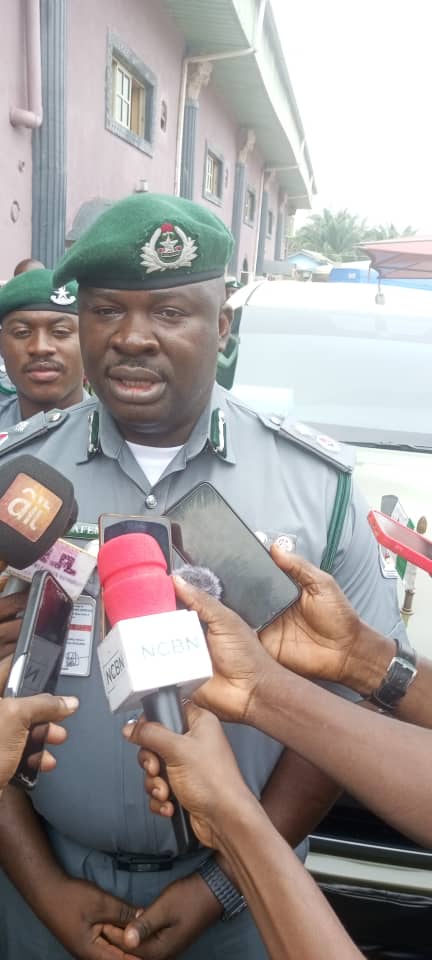
By Izuchukwu Ozoemena
The Acting Customs Area Controller (CAC), Ogun Area 1 Command of the Nigeria Customs Service, Deputy Comptroller O.O.Afeni says the Festival of Arts For Economic Development (FAED) continues to reflect a shared understanding that sustainable border management goes beyond enforcement to encompass cross-border cooperation, economic empowerment and entrepreneurship development within the border communities.
Deputy Comptroller Afeni spoke at the Idiroko Border, Thursday, while declaring open the international colloquium to mark the 5th edition of the Festival of Art for Economic Development to which the Nigeria Customs Service is a strategic partner.
He said: “The theme, ‘Rebranding Borderline Communities through Creative Empowerment and Entrepreneurship,’ aligns with the Nigeria Customs Service’s commitment to supporting legitimate trade, encouraging value addition, and promoting small-scale enterprises as drivers of economic growth and border stability.
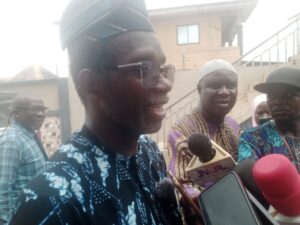
Dr Bonny Abisogun Botoku, Executive Producer, FAED.
He acknowledged the important role of the Nigeria–Benin Inter-Border Forum, under the leadership of its Permanent Secretary, Dr. Bonny Abisogun Botoku in advancing preventive diplomacy, structured dialogue and operational cooperation between Nigeria and the Republic of Benin.
”Through the empowerment programmes and entrepreneurship initiatives embedded in this Festival, we see practical pathways to reducing illicit activities, strengthening lawful commerce, and fostering inclusive economic opportunities for our people.”

Deborah Chiamaka Nwangene, one of the graduating trainees.
”The Nigeria Customs Service remains committed to partnerships that promote peaceful borders, resilient economies and sustainable regional integration.”
During a brief press chat, Comptroller Afeni spoke about enforcing government fiscal policies, saying that this must not be by force.
”The citizens must be made to know the reasons we are here. This is a way of showing the communities that we care about them. You can see that we have trained some people in the art of garri- making painting tye and dye (adire), etc. It’s a way of empowering the community.”
On suggestions that the seminar is capable of deepening cordial relationship between Benin and Nigeria, the CAC could not agree less.
”It is the fifth edition. It has been a situation we see the succeeding version getting better than the previous one. Today, I signed many certificates of people graduating. We’re not just training them; we’re empowering them so that we take them off the smuggling realm and make them better citizens.”
In his presentation, the Executive Producer of the Festival, Dr Bonny Abisogun Botoku described it as more than an event.
”It is a movement. It is a statement of belief—that border communities are not problems to be managed, but potentials to be unlocked.”
He recalled that for too long, border communities across Africa have been spoken about only in the language of risks exemplified in smuggling, insecurity, informality and marginalization.
”But those of us who live and work at the borders know a deeper truth. Borders are not just lines on maps. They are meeting points of culture, gateways of trade,
and spaces of shared history.

Sample of garri processed and packaged by a trainee.
”The Nigeria–Benin border is not a dividing line—it is a shared civilization. What we are doing through this Festival is to change the story from suspicion to trust, from survival to enterprise,
from isolation to integration.
Contrary to the widely-held belief that culture only concerns entertainment, he explained, culture is power, identity and economic capital.
”Through art, music, fashion, crafts, food systems, and storytelling, communities rediscover pride, cohesion, and voice.
Culture becomes a language of peace, dialogue, and diplomacy—especially in border spaces where differences must be managed with wisdom.
”This Festival deliberately places culture at the center of development, not at the margins.”
Distinguished guests at the event included the Onitaege of Itaege, HRM Oba Matthew Ademola Abisoye and other respected traditional rulers, government officials and representatives of security agencies. Others were partners from the Republic of Benin, artists, cultural practitioners and trainees.
-

 Customs3 weeks ago
Customs3 weeks agoFreight Forwarders Warn FAAN To Halt New Charges In Airport Cargo Operations or Risk Rumble in the Sector .
-
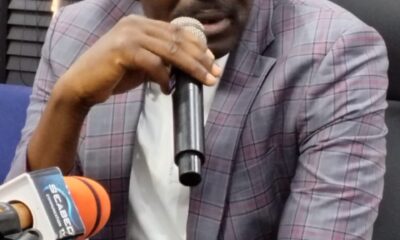
 Maritime Agencies3 weeks ago
Maritime Agencies3 weeks agoNAGAFF Pledges Watertight Enforcement, Unveils A More Formidable 100% Compliance Team.
-

 Maritime Agencies3 weeks ago
Maritime Agencies3 weeks agoLekki Deepsea Port: The Success Story of the Nigerian Ports Authority.
-
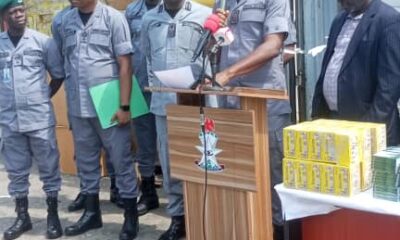
 Maritime Agencies2 weeks ago
Maritime Agencies2 weeks agoWe’re Ever Proactive In Intercepting Prohibited, Falsely Declared Goods, says Controller Onyeka.
-
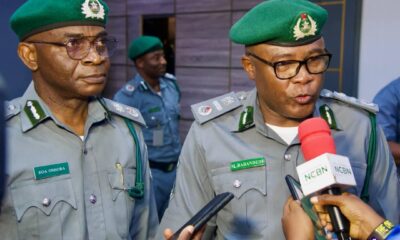
 Maritime Agencies3 weeks ago
Maritime Agencies3 weeks agoZone ‘A’ Coordinator, Mohammed Babandede, Visits Apapa Command, Commends Officers’ Sterling Performance.
-
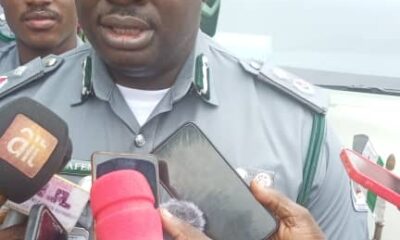
 Customs2 weeks ago
Customs2 weeks agoOgun 1 Customs Hosts FAED 2026, Highlights Gains of Cross-Border Cooperation, Economic Empowerment and Entrepreneurial Development.
-

 Maritime Agencies4 days ago
Maritime Agencies4 days agoSEA EXPERIENCE: NSML Inducts 30 MAN Oron Cadets for On-board Training
-

 Maritime Agencies18 hours ago
Maritime Agencies18 hours agoCustoms Unveils Automation of Licenses and Permits, Seeks Full Cooperation from Stakeholders.




